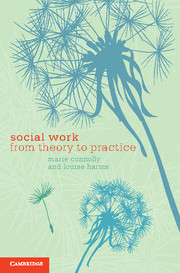Book contents
- Frontmatter
- Contents
- List of figures
- Preface
- Acknowledgements
- 1 Social work knowledge, theory and practice
- 2 Frameworks, models and practice
- 3 Ecosystems theories
- 4 Onion-peeling theories
- 5 Faulty-engine theories
- 6 Story-Telling Theories
- 7 Mountain-moving theories
- 8 Reflective practice and theory
- Concluding thoughts
- References
- Index
- References
4 - Onion-peeling theories
- Frontmatter
- Contents
- List of figures
- Preface
- Acknowledgements
- 1 Social work knowledge, theory and practice
- 2 Frameworks, models and practice
- 3 Ecosystems theories
- 4 Onion-peeling theories
- 5 Faulty-engine theories
- 6 Story-Telling Theories
- 7 Mountain-moving theories
- 8 Reflective practice and theory
- Concluding thoughts
- References
- Index
- References
Summary
IN OUR PREVIOUS CHAPTER we explored systems theories and how they have provided an overarching focus for social work practice. In many ways, onion-peeling theories have some of the same characteristics as systems theories. Within psychodynamic and person-centred approaches, for example, the primary systems of focus are our inner selves and our inner-world organisation, and family or relational systems. The system of the self (both conscious and unconscious) emerges through systems of relationship with others. Unlike the broader ecological approaches, however, they focus on very specific relational systems. They share some of the language of systems theories in relation to boundaries, roles and dynamics, but their use is informed by different theoretical understandings.
We have used the metaphor of onion peeling to describe the characteristics of insight-focused theories because they seek to peel back layers of experience to reach understanding. Like an onion, human experience reflects a layering: layer upon layer, building up around us and influencing our lives, sometimes in complex and repetitive ways. These layers, accumulated throughout our lives, have the potential to protect us positively and help us to make our way in the world. At other times they can present barriers to the realization of important needs and wants. Onion-peeling theories focus on peeling back these layers so that we can see how they influence who we are today. By increasing our awareness of these influences and understanding their origins, it becomes possible to engage in conscious change and develop greater emotional maturity. Awareness and insight lead to change and optimal functioning.
- Type
- Chapter
- Information
- Social WorkFrom Theory to Practice, pp. 73 - 100Publisher: Cambridge University PressPrint publication year: 2011



